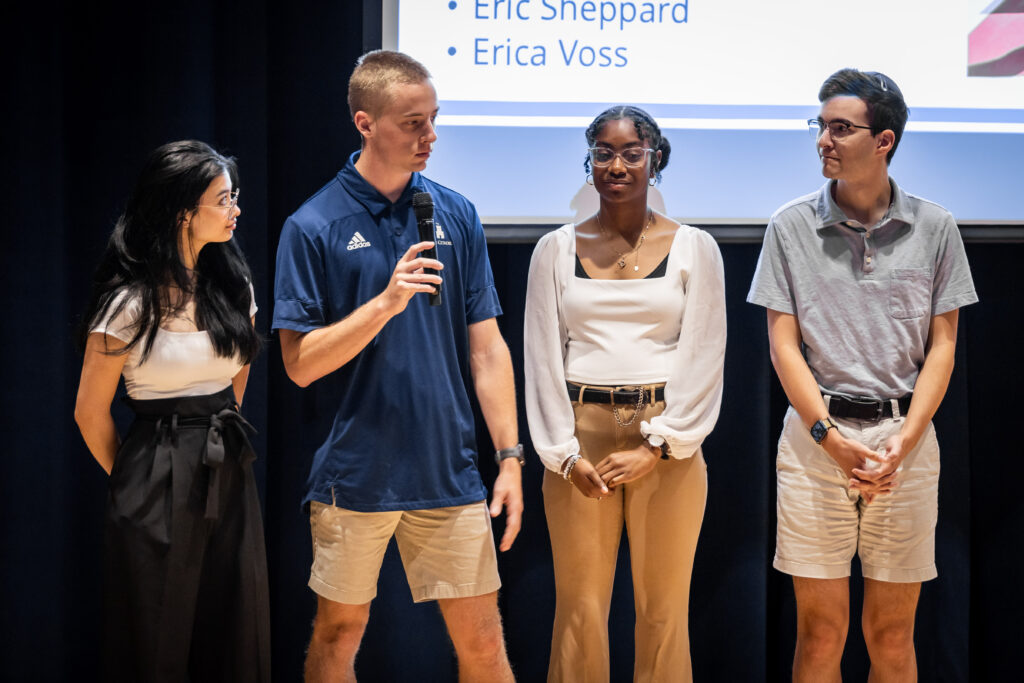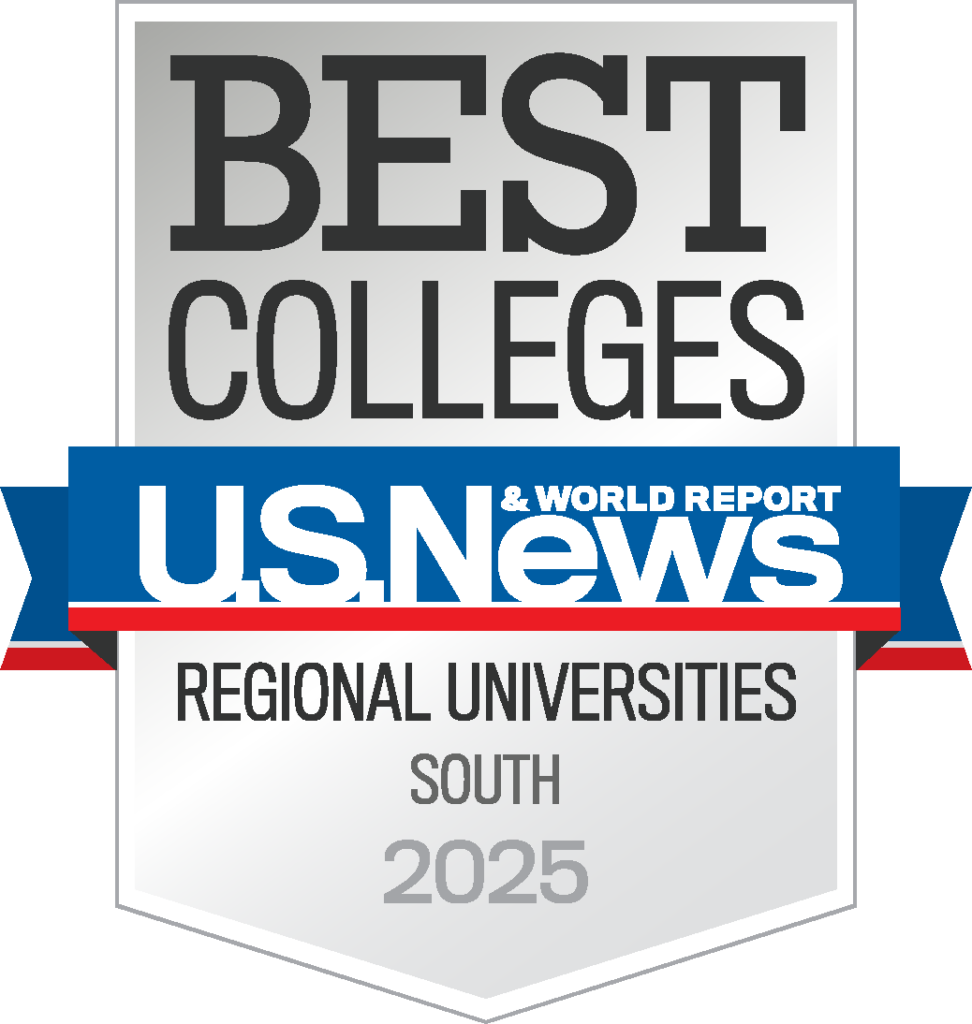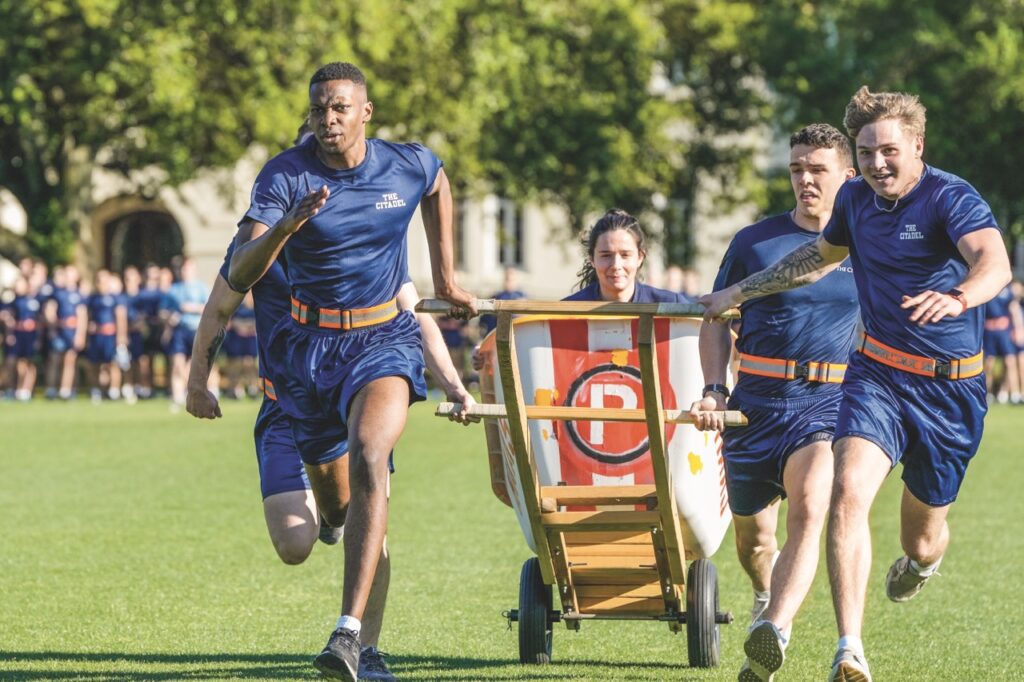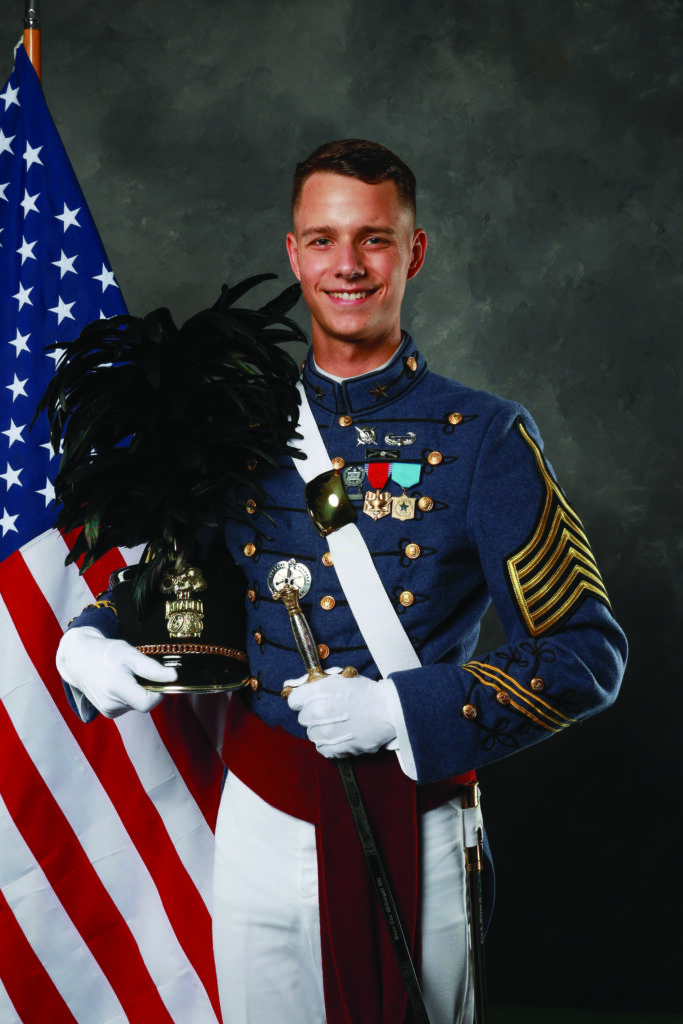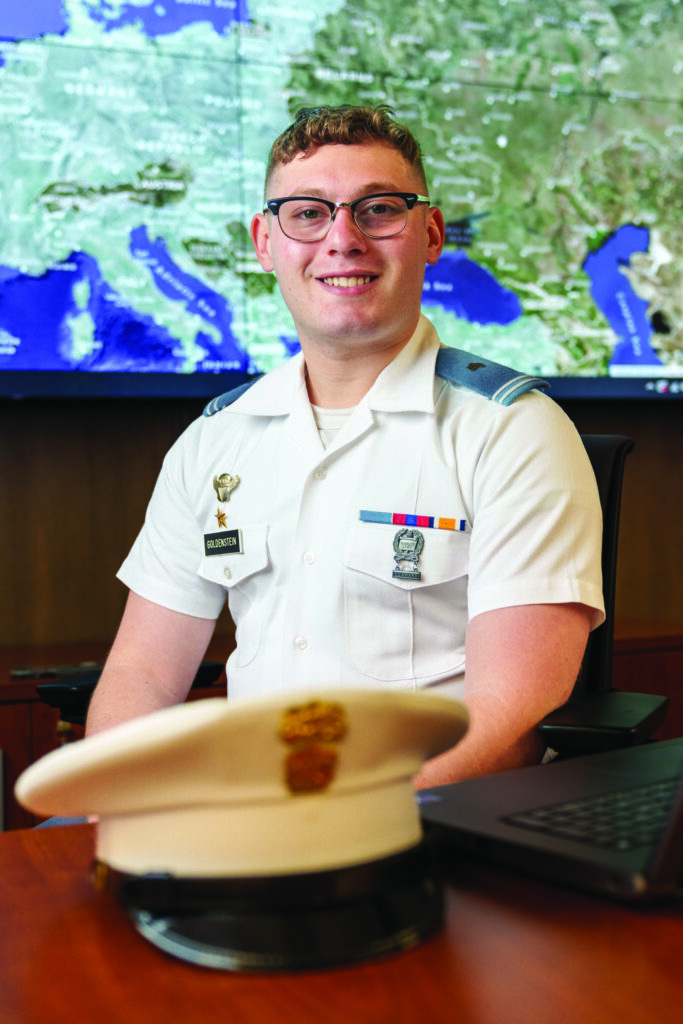Each fall, The Citadel Foundation hosts the Leaders in Philanthropy induction ceremony. The event celebrates the generosity of those donors whose lifelong support allows the college to pursue its vision of achieving excellence in the education of principled leaders.
Members of the college’s lifetime, legacy and loyalty giving societies gather on campus to be honored in front of their peers.
The Citadel’s lifetime giving societies honor those individuals who have expressed their profound commitment to the college through their leadership gifts totaling $100,000 or more by the close of the preceding calendar year. Donors who have included The Citadel in their estate plans become members of The Citadel Legacy Society.
Through the Order of the Tartan, we acknowledge those loyal donors who have given consecutively at any level for 25 years or more. Beginning at the five-year mark, donors are recognized for their consecutive giving with a tartan-patterned lapel pin, with additional recognition offered at 10, 15, and 20 years. Upon reaching the 25th year, these loyal donors receive their tartan sash and are officially inducted into the Order of the Tartan at the annual ceremony.
The Citadel Foundation proudly welcomes the new Leaders in Philanthropy listed here who have joined their peers in this annual tradition celebrating charity and service as virtues of the principled leader.
On behalf of the South Carolina Corps of Cadets and the entire campus community, we salute these individuals for their extraordinary generosity, vision and lifelong loyalty to The Citadel.
For more information about The Citadel Foundation’s lifetime giving societies or to view the roster of all current members, please visit: foundation.citadel.edu/lifetimegiving.
Class of 2024 New Inductees
∆ = Increased Giving Level
Lifetime Giving Societies
Founders’ Society – Bronze
$5,000,000 to $9,999,99
Just as the founders of The Citadel conceived of an institution that would “awaken greater ardor in the people, and a warmer interest in our rulers, to advance the cause of education,” members of the Founders’ Society demonstrate the vision and commitment that will ensure the long-term vitality of the college. The Founders’ Society is The Citadel’s most prestigious giving society.
Capt. and Mrs. John C. Velotta ∆
Society of 1842
$1,000,000 to $4,999,999
Since its founding in 1842, The Citadel has molded individuals into citizen-soldiers who put into action the guiding principles learned in the barracks, in the classroom and on the parade field as they serve their families, their communities, their professions and their country with distinction.
Mr. and Mrs. H. Walter Anderson, ’61 ∆
Mr. and Mrs. Charles L. Hardaway, ’71 ∆
Mr. and Mrs. Robert R. Hill, Jr., ’88 ∆
Mr. and Mrs. William P. Jones, ’68 ∆
Mr. and Mrs. Charles B. Lawless, ’94 ∆
Col. John G. Mentavlos, USAFR, ’74, and Dr. Marian F. Mentavlos, CGC ’78
Mr. and Mrs. Phillip F. Ousley, ’95 ∆
Mark Clark Society
$500,000 to $999,999
Gen. Mark W. Clark (1896-1984) became president of The Citadel after a career seldom equaled in the United States Army. During his tenure (1954-1965), The Citadel achieved international recognition, and the Corps of Cadets increased to the maximum capacity of the barracks. One of Clark’s most enduring accomplishments was founding of the Cadet Honor Code, whereby a cadet does not lie, cheat, or steal, nor tolerate those who do.
Mr. and Mrs. H. Walter Anderson, ’61 ∆
Mr. and Mrs. Charles L. Hardaway, ’71 ∆
Mr. and Mrs. Robert R. Hill, Jr., ’88 ∆
Mr. and Mrs. William P. Jones, ’68 ∆
Mr. and Mrs. Charles B. Lawless, ’94 ∆
Col. John G. Mentavlos, USAFR, ’74, and Dr. Marian F. Mentavlos, CGC ’78
Mr. and Mrs. Phillip F. Ousley, ’95 ∆
Mr. Charles M. Anderegg, Jr., ’74
Mr. J. Eric Wooten, ’79, and Ms. Kathleen Cartland, CGC ’97 ∆
Mr. and Mrs. J. Christopher Clark, ’85 ∆
Mr. and Mrs. Richard L. Cook, Jr., ’84 ∆
Mr. and Mrs. Daniel B. Crosby, ’95 ∆
Mr. and Mrs. Jerry F. Friedner, ’60 ∆
Mr. F. Xavier Starkes, ’84
Mr. Heyward B. Sutherland, ’70 ∆
Mr. Christopher H. White, ’82
Mr. J. Eric Wooten, ’79, and Ms. Kathleen Cartland, CGC ’97 ∆
Star of the West Society
$250,000 to $499,999
Citadel graduates have served their country in every conflict since the Mexican War. Named for the historic Civil War action led by a detachment of Citadel cadets, the Star of the West Monument on Summerall Field commemorates all cadets and graduates who have died in defense of their country and recognizes the strong call to service demonstrated by Citadel men and women.
Dr. D. Virgil Alfaro III, USAF, ’84
Col. and Mrs. Robert J. H. Anderson, ’69 ∆
Mr. and Mrs. Travis S. Archenhold, ’99
Col. Thomas H. Brett, USA, Ret., ’63 ∆
Mrs. Beverly Brumfield ∆
Mr. and Mrs. James J. Ethridge, Jr., ’81 ∆
Mr. and Mrs. Alexander F. Giles, III, ’83 ∆
Mr. and Mrs. John G. Harrison, IV, ’93
Mr. and Mrs. Edward R. Hostetter, ’83
Mr. and Mrs. James A. King, II, ’71 ∆
Prof. and Mrs. Timothy J. Louwers
Mr. and Mrs. Matt F. Miller, ’71 ∆
Terence N. Moore, M.D., USAF, ’64 ∆
Mr. and Mrs. J. Derrick Murdock, ’97 ∆
Lt. Col. Llewellyn E. Piper, ’70, and
Mrs. Cynthia Piper, CGC ’71 ∆
Col. Robert T. Sandford, USA, ’84 ∆
Mr. and Mrs. R. Edward Turner IV, ’85 ∆
Summerall Society
$100,000 to $249,999
Gen. Charles Pelot Summerall (1867-1954) assumed the presidency of The Citadel in 1931 after retiring as chief of staff of the United States Army. During his 22-year tenure as president, the campus was greatly expanded to include many of the buildings that shape The Citadel footprint today, including Summerall Chapel, Capers Hall, LeTellier Hall and McAlister Field House.
Anonymous (1)
Mr. and Mrs. Brandon E. Boyles, ’89
Lt. Col. and Mrs. Jay M. Bradbury, ’66
Mr. and Mrs. Donald P. Bridenbaugh II, ’84
Dr. and Mrs. Ransom L. Bryan, Jr., ’74
Mr. and Mrs. Quinton M. Caldwell, Sr., ’66
Joyce Carusi
Mr. and Mrs. Charles S. Cornwell, ’94
Col. Stephen Cotter, ’70, and Ms. Sharon Winningham
Mr. and Mrs. Jack R. Cunningham, ’77
Mr. and Mrs. Alfred W. D’Ambrosio, ’72
Col. and Mrs. F. Greg Delleney, Jr., ’74
Mr. and Mrs. Sidney Doobrow, ’65
Mr. and Mrs. Donald J. Doody, ’73
Mr. and Mrs. James E. Fayssoux, Jr., ’66
Mr. and Mrs. Wes Fuller
The Honorable C. Tolbert Goolsby, Jr., USA, ’59
Mr. J. Brian Grab, ’79
Mr. Tommy M. Griffin and Dr. Jackie Griffin
Ms. Katherine G. Harrison
Mr. and Mrs. Jack B. Healan, Jr., ’67
Mr. Mark W. Jordan, ’93
Mr. Lewis E. Lancaster III, ’98
Mr. S. William Lehew, III, ’78
Mr. and Mrs. Stephen J. Maye, ’83
Mr. and Mrs. Charles A. McClure, Jr., ’74
Mr. and Mrs. James V. McMillan, III, ’69
Mr. and Mrs. Larry L. Melton, Jr., ’84
Mr. Brett S. Miller, ’07, and Mrs. Sarah L. Miller, CGC ’12
Mr. and Mrs. Rupert E. Moredock, ’75
Mr. and Mrs. Robert D. Moseley, Jr., ’88
Mrs. Juanita Motley
Col. and Mrs. Russell V. Olson, Jr., ’69
Mr. and Mrs. David A. Peacock, ’84
Mr. Lannes C. Prothro IV, ’00
Mr. and Mrs. Raymond C. Reiss, ’75
Mr. Victor M. Rivera, Jr., ’81
Lt. Col. Stephen V. Smith, USA, Ret., ’84
Mr. and Mrs. Thomas K. Sturgeon, ’88
Col. and Mrs. David G. Tarbox, ’71
Mr. and Mrs. J. Edward Terrell, ’84
Dr. and Mrs. Howard S. J. Walker III, ’71
Mr. and Mrs. Chester A. Wingate, Jr., ’74
Lt. Col. James C. W. Wright, USAF, ’66
Legacy Society
Planned Giving
The Citadel Legacy Society recognizes alumni and friends who support The Citadel with deferred gifts. Through their generosity and foresight, legacy donors help to secure the future of the institution through a variety of estate planning tools. The Citadel Legacy Society is open to individuals who have included The Citadel in their estate planning and who provide the college with documentation of their gift.
Mr. Charles M. Anderegg, Jr., ’74
Mr. and Mrs. Travis S. Archenhold, ’99
Lt. Col. and Mrs. Stephen E. Bishop, ’73
Col. Thomas H. Brett, USA, Ret., ’63
Mr. and Mrs. Donald P. Bridenbaugh II, ’84
Mr. Ryan A. Cass, ’15
Col. William M. Connor V, ’90, and Dr. Susan K. Connor
Mr. and Mrs. Charles S. Cornwell, ’94
Mrs. Ana S. Costas
Mr. J. Brian Grab, ’79
Col. and Mrs. John S. Graham, ’77
Col. and Mrs. Myron C. Harrington, Jr., ’60
Mr. and Mrs. John G. Harrison, IV, ’93
Ms. Katherine G. Harrison
Mr. and Mrs. David K. Hudson, ’84
Col. and Mrs. Wayne P. Hudson, ’79
Mr. and Mrs. Charles B. Lawless, ’94
Prof. and Mrs. Timothy J. Louwers
Col. John G. Mentavlos, USAFR, ’74, and Dr. Marian F. Mentavlos, CGC ’78
Mr. and Mrs. Rupert E. Moredock, ’75
Mr. and Mrs. Robert F. Musso, ’10
Col. and Mrs. Henry M. Reed, II, ’60
Mr. and Mrs. William F. Ruoff III
Lt. Col. Stephen V. Smith, USA, Ret., ’84
Mr. F. Xavier Starkes, ’84
Mr. Heyward B. Sutherland, ’70
Capt. and Mrs. John C. Velotta
Mr. Christopher H. White, ’82
Maj. Gen. and Mrs. F. Eli Wishart, Jr., ’63
Lt. Col. James C. W. Wright, USAF, ’66
Order of the Tartan
Consecutive Giving
The Scottish tartan, a woolen cloth woven in a distinctive pattern of plaid, has long served as a symbol of loyalty and association with a particular region, family or clan. The Order of the Tartan recognizes and celebrates those loyal donors who have given consecutively to The Citadel each year for 25 years or more.
Col. and Mrs. Robert J. H. Anderson, ’69
Mr. and Mrs. Gary L. Canady, ’69
Lt. Col. and Mrs. Paul K. Cascio, ’69
Mr. and Mrs. J. Larry Clark, ’64
Mr. and Mrs. Joseph K. Coffey, ’92
Mr. and Mrs. Richard B. Colburn, Jr., ’89
Maj Gen and Mrs. B. Keith Coln, ’74
Mrs. Linda Crittenden
Mr. Victor M. Dillingham, ’59
Mr. and Mrs. Peter D. Dorn
Mr. and Mrs. R. Burrell Dosher, Sr., ’88
Lt. Col. and Mrs. John W. Falkenbury, ’78
Mr. and Mrs. Ronald D. Fish
Mr. and Mrs. Dexter R. Floyd, ’68
Mr. C. Thomas Fowler, ’55
Mr. and Mrs. Jonathan T. Hall, ’73
Dr. and Mrs. Kevin L. Harbol, ’81
Mr. Dan D. Hardy, Jr., ’69
Mr. and Mrs. Theodore A. Hargrove, III, ’71
Mr. William E. Jenkinson, IV, ’99, and Mrs. Meredith M. Jenkinson, CGC ’01
Mr. and Mrs. J. Andrew Keel, Jr., ’66
Lt. Col. Frederick J. Kennedy, USA, Ret., ’68
Mr. and Mrs. Alfred R. Kennickell, Jr., ’77
Mr. and Mrs. Daniel J. Kohl, ’78
Dr. and Mrs. George S. Kotchmar, Jr., ’66
Dr. and Mrs. Charles A. Leath III, ’94
Col. Allison D. Love, SCM, CGC ’93, and Mr. Phillip E. Love, Jr.
Mr. William W. Marchant, Jr., USAR, ’56
Mr. and Mrs. Charles H. McArver, Jr.
Mr. and Mrs. James H. McDaniel, Sr., ’76
Ms. Shannon Mease
Mr. and Mrs. Robert D. Moseley, Jr., ’88
Col. Robert D. Offer, Jr., ’61, and Ms. Carole Rutland
Col. and Mrs. Russell V. Olson, Jr., ’69
Mr. and Mrs. Frank B. Peters, Jr., ’60
Lt. Col. and Mrs. Gilbert A. Pohl, ’76
Mr. and Mrs. Douglas E. Pounder, ’71
Mr. and Mrs. J. Scott Price, ’88
Lt. Col. and Mrs. David B. Reed, III, ’59
Mr. and Mrs. Scott R. Shotto, ’83
Cmdr. and Mrs. Edward K. Thompson II, ’76
Mr. and Mrs. Conrad J. Tuza, ’58
Mr. Thomas H. Warley, ’85, and Dr. Melinda A. Warley
Mr. and Mrs. Maxwell E. Westmoreland, ’63
Mr. and Mrs. Richard C. Winsch, ’69
Capt. and Mrs. John O. Woods, Jr., ’64
Lt. Col. and Mrs. Robert B. Young, ’66
Col. and Mrs. Samuel R. Young, ’69

